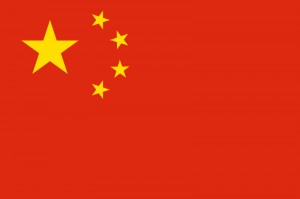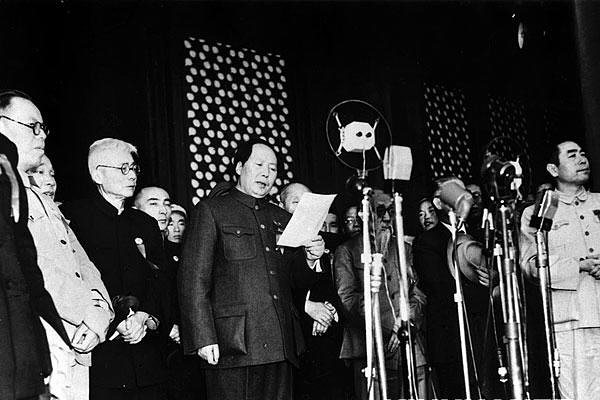 The victory of the Communist Party against the Kuomintang Party led to the creation of the People’s Republic of China on October 1, 1949. Mao Zedong was the chairman of the Communist Party wile Zhou Enlai was the premier of the State Administrative Council. The party was composed mostly of members from the peasant sector and claimed to be at 4.5 million at that time. There were four social classes composed of workers, peasants, petite bourgeoisie and the national capitalist. Soviet Union was the primary backer of China during that time when other countries were backed up by western allies headed by United States of America. Japan was still an enemy country for China because of previous invasions made so they monitored any alliances made by Japan. On February 1950, China signed the Treaty of Friendship, Alliance and Mutual Assistance with the Soviet Union that was valid for thirty years, up to 1980.
The victory of the Communist Party against the Kuomintang Party led to the creation of the People’s Republic of China on October 1, 1949. Mao Zedong was the chairman of the Communist Party wile Zhou Enlai was the premier of the State Administrative Council. The party was composed mostly of members from the peasant sector and claimed to be at 4.5 million at that time. There were four social classes composed of workers, peasants, petite bourgeoisie and the national capitalist. Soviet Union was the primary backer of China during that time when other countries were backed up by western allies headed by United States of America. Japan was still an enemy country for China because of previous invasions made so they monitored any alliances made by Japan. On February 1950, China signed the Treaty of Friendship, Alliance and Mutual Assistance with the Soviet Union that was valid for thirty years, up to 1980.
Involvement in the Korean War
 The Communist government was slowly being recognized by other countries but then China got involved in the Korean War of 1950 that resulted in sanctions made by the U.N. A global embargo on shipments of arms and other war materials was imposed on China. North Korea, also a communist nation requested for help from China during the Korean War. The People’s Liberation Army marched into North Korea as a response to their request for help. During this time, China also fought resistance from its own province of Xizang to finally control it as it was independent from Chinese rule since the fall of Qing dynasty. These actions disallowed China from being recognized by the U.N. and Taiwan was still recognized as the Republic of China.
The Communist government was slowly being recognized by other countries but then China got involved in the Korean War of 1950 that resulted in sanctions made by the U.N. A global embargo on shipments of arms and other war materials was imposed on China. North Korea, also a communist nation requested for help from China during the Korean War. The People’s Liberation Army marched into North Korea as a response to their request for help. During this time, China also fought resistance from its own province of Xizang to finally control it as it was independent from Chinese rule since the fall of Qing dynasty. These actions disallowed China from being recognized by the U.N. and Taiwan was still recognized as the Republic of China.
Eliminating Dissent
After the Korean War, China focused on domestic policies and the elimination of state enemies. They made massive campaigns against war criminals, traitors and capitalists which they branded as enemies of the state. Even foreigners and Christian missionaries were not spared as they were accused of being agents of the United States of America. Massive trials were conducted that were attended by huge crowds to show that China is serious in eliminating their enemies. The Agrarian Reform Law was established on June 28, 1950 which accelerated the land reform. The idea was to make wealthy peasants and dissolve the landlords. Mao wanted all the people to follow the interest of the working class. All against his policies were convicted and branded enemies of the state. The government was against tax evasion and corruption. Businessmen and capitalist trying to corrupt government officials were uncovered and persecuted.
Industrialization and Economic Growth
Efforts were made to achieve rapid industrialization for the country to achieve economic growth. China relied on technology coming from Soviet Union to help them in their industrialization. Machines, technical assistance and military hardware were supplied by Soviet Union. The first national census of China was made in 1953 to help them in their economic planning. They found out that the population of China was about 583 million which was very large compared from their early projection. The government realized the most important needs of the people which are food for the large population and funds for domestic capital and purchase of Soviet technology. The government began the collectivization of agriculture, nationalized banking, industry and trade. Private enterprise was abolished.
Government Centralization
Major political developments were made. The party and government administration were centralized. In 1953 delegates were elected for the First National People’s Congress which became China’s legislature. The congress met in 1954 and made the state constitution and Mao was elected as chairman of the People’s Republic, and Liu Shaoqi as chairman of the Standing Committee of the National People’s Congress, and Zhou Enlai as premier of the State Council. Improvements were made by the government to facilitate its growth. The need for intellectuals was emphasized due to rapid developments and infrastructures. To encourage more intellectuals the government allowed the people to openly make their views of the government. This backfired as criticisms and protests were made against the government. The Communist Party was embarrassed and labelled the critics as rightists. The anti-rightist campaign resulted in many deaths.
Mao Zedong’s Campaigns
Mao wanted to remove all those people who are against his cultural revolution. His idea was to remove the old traditions of China. His methods were harsh, and many perished during his reign. The Red Guards were used to terrorize those they suspected were against Maoist ideals. Education and public transportation suffered and affected the lives of the citizens. Ordinary people were made to recite the quotations of Mao. Many political leaders who opposed Mao’s rule were ousted and imprisoned. Even Mao’s allies before were not spared, including Liu Shaoqi. This campaign against the enemies of the government ended only when Mao died in 1976. Mao’s supporters claimed that during his era, China was united and foreign imperialists were ousted from the country. There were rapid developments in the country that were not achieved before.
After Mao Zedong’s death, Deng Xiaoping was able to rise from the others fighting for power and finally became the leader of China in 1980. He implemented various industrial reforms and started decentralization of government controls in industrial sectors. Standards of living improved drastically because of the economic reforms. Although development was very high, Deng’s government was not free from criticisms. Protests were made resulting to several deaths in Tiananmen Square. Deng retired and transferred power to Jiang Zemin. Economic developments continued to improve the lives of its people.
China Today
Before the year 2000 came, foreign colonies were returned to China, Hongkong in 1997and Macau in 1999. China’s economy was very strong during the Asian Financial Crisis and continued to grow at the start of the 21st century. Foreign policies continued to prosper and China’s support for the war on terror made it closer to United States. Economic developments continued to rise for China and they were able to host the 2008 Summer Olympics which showcased their current growth and development and proving that the country is one of the most powerful countries currently.
